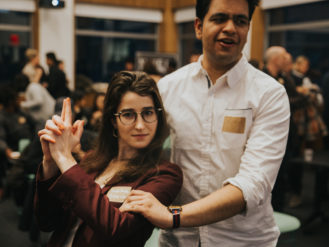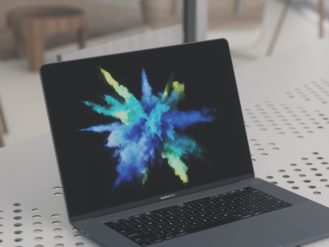An Idea for a Smart Menstrual Pad Wins a Pitch Contest
The founder of a Brooklyn startup, BUPeriod, makes a convincing case for a hygiene product that's internet-connected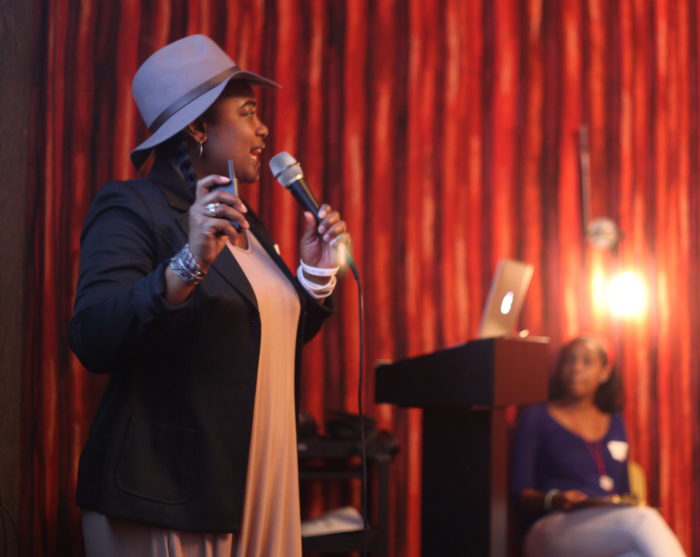
BUPeriod founder founder Vanessa Siverls makes her pitch (Photos courtesy of the Downtown Brooklyn Partnership)
The mission of many (if not most) startups is to deploy technology to solve human dilemmas. At the Female Founders Pitch Contest in Brooklyn this week, five entrepreneurs explained (briskly) how their startups would fix issues related to language barriers, apparel manufacturing, science education, the process of aging, and menstrual periods.
Brooklyn has been ranked as the town with the highest percentage of female founders and this event, part of a series presented by the Downtown Brooklyn Partnership, is meant to build on that foundation. At the contest, which took place at the Made in New York Media Center by IFP in Dumbo, each founder had three minutes to make her pitch to a panel of all-female judges, who then had three minutes to ask questions.
The founders were competing for a $5,000 cash prize, a free workspace for two people at one of NYU Tandon School of Engineering’s business incubators, and free legal advice. “I am so proud to be here with these strong women and I’m inspired,” said Debbie Cooper, a vice president of business banking at JPMorgan Chase, a sponsor of the event. Indeed, as the judges deliberated after the pitches, there was a strong sense of camaraderie flowing through the venue.
The winner: BUPeriod, a Brooklyn startup that’s developing a feminine hygiene product designed to help women who have issues managing their menstrual cycles. Excerpts from the five pitches:
1. Creating a "smart pad" to empower women
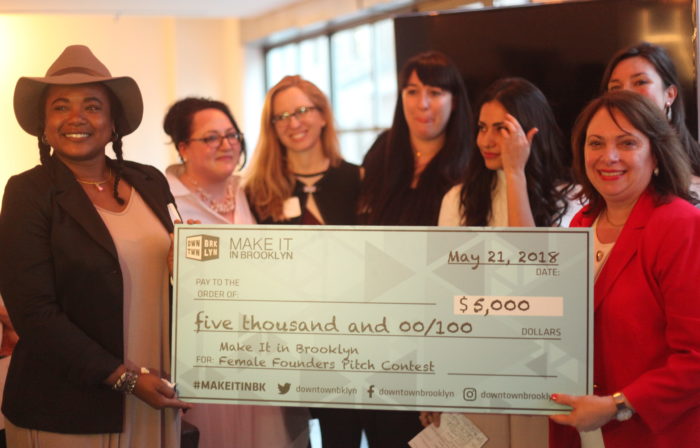
Based on personal experience, founder Vanessa Siverls (above, at left) decided to found BUPeriod (pronounced “be you, period”) to give women a better sense of control throughout their menstrual periods. “I was one of those women that needed to be empowered,” she said. “In 2015, doctors removed 22 fibroids from my uterus. Now, fibroids are not the only thing that can cause havoc on your period. We have endometriosis, PCOS [polycystic ovary syndrome], and other illnesses. They can cause excessive bleeding and there were no products for me during that time. They were all flat, filled with chemicals, and they just didn’t fit.”
Siverls believed she could make a better product, one that women would embrace. Her startup is at work developing a prototype made of hemp and designed be comfortable and effective. In addition, the pad would be sensor-equipped and have the ability to convey data to its user wirelessly.
2. Turning science education into a game
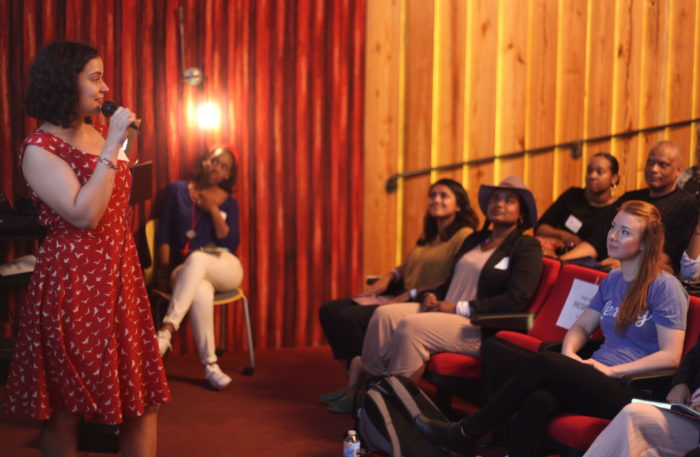
Killer Snails creates games to make the process of learning about science more fun and engaging. Killer Snails: Assassins of the Sea is a card game in which players “attack, feed & strategize your way to victory.” Another game, Biome Builder, enables students to explore the worlds of four different biomes while building a food chain in each one (Amazon Rainforest, American Prairie, Sahara Desert, and Pacific Ocean). Coming next is BioDive, a virtual-reality game. Said co-founder Jessica Ochoa Hendrix (above), who worked in K-12 education for nine years and later earned her MBA: “In all of our games and experiences, students are put in the role of the scientist so that it becomes more familiar to them and they become used to those styles and habits.”
3. Finding a foreign-language buddy
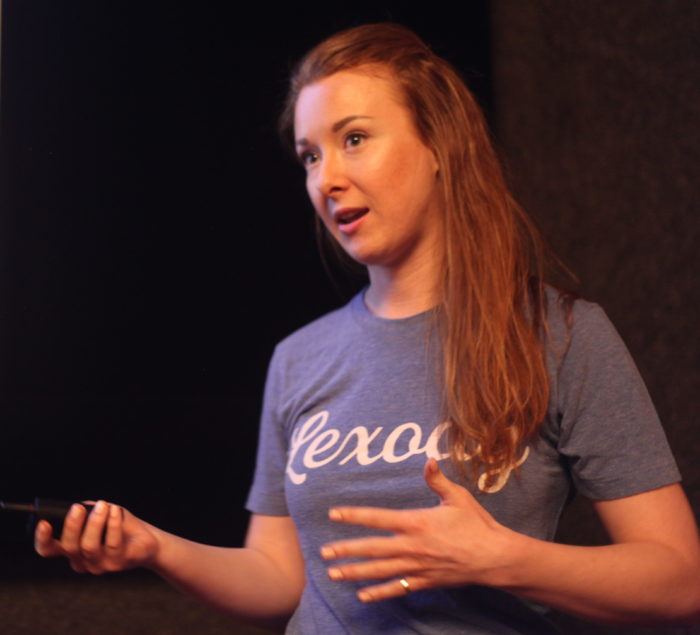
Sure, you can take classes and develop a nodding acquaintance with a foreign language. But really knowing it? “Fluency requires immersion,” declares the startup Lexody, which provides a technical means to dive right in. One of the best tools is interacting with a native speaker, said founder Walsh Costigan (above). While Costigan was in college, she spent time studying abroad in France. When she returned to the U.S., Costigan wanted to keep up her newly learned language. But a search for a native-speaking conversation partner didn’t find the resource that she was looking for.
Thus was born Lexody, a mobile app that facilitates meetups between native speakers who want to become more proficient in one another’s language. The format: a one-hour meeting, conducted for 30 minutes in each language. Said Costigan: “We have several thousand users and our main demographic has been millennials. The number one thing millennials want right now is an experience, and Lexody brings the experience to languages.”
4. Speeding up fashion work
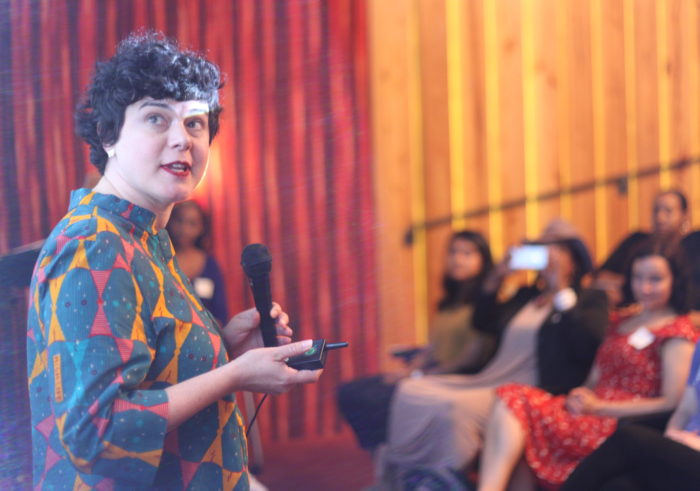
Shimmy, from Brooklyn-based Shimmy Technologies, provides a conduit that connects the teams involved in manufacturing apparel, which are often in far-flung locations. Among the goals are speeding up workflow and teaching workers about new techniques and products. “We’ve got a proto-approval app that allows product design teams to get through product development cycles quickly. And then on the other side, we’ve created a video game to upskill garment workers,” said founder Sarah Krasley. She added, “These folks are in the most danger of getting displaced by automation technology and we’re doing work to upskill them.”
5. Helping seniors connect with tech
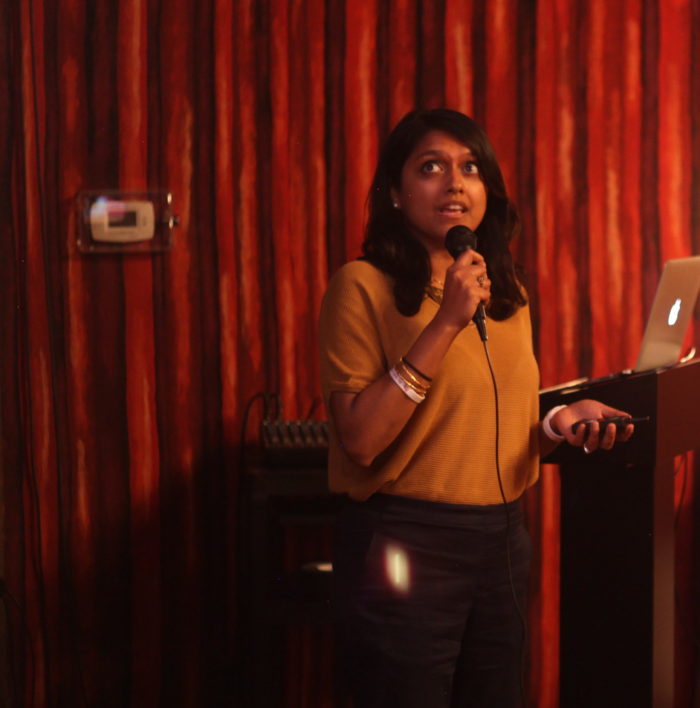
Soundmind takes programs like Amazon’s Echo and other artificial-intelligence programs and adapts them to the senior community, serving both the aging and their caretakers. The programs make calls, calendars, and social networking easier and more accessible. Said founder Erum Azeez Khan: “Many seniors have difficulty using smartphones and navigating the digital landscape. This causes them to be isolated from their community and also limits their access to information. Caregivers have their own challenges: they’re overworked, they’re stressed, and they need some help ensuring that seniors can have access to their own information.”
One of the other programs that Soundmind has created is called Memory Lane, which reminds those having trouble with their memory about past events in history that will help remind them about their own lives.
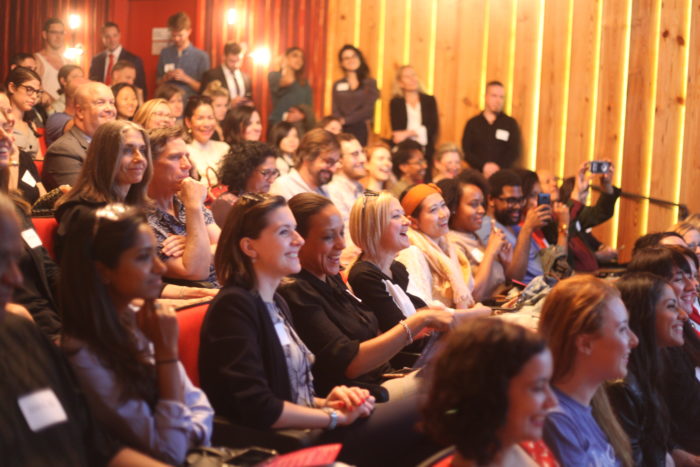
The audience at the Made in New York Media Center were treated to five startup pitches
(The five contest judges: Azita Ardakani, partner at Honeycomb Portfolio; Jacquelyn De Jesu, founder and CEO at Shhhowercap; Angela Harrington, vice president, communications and external relations at Berkeley College; Jennifer Iannolo, founder and CEO of the Concordia Project; and Deborah Zajac, director of Touchdown Ventures. The contest’s emcee was Kia Brooks, associate director for sales and operations at the Made in NY Media Center.)





